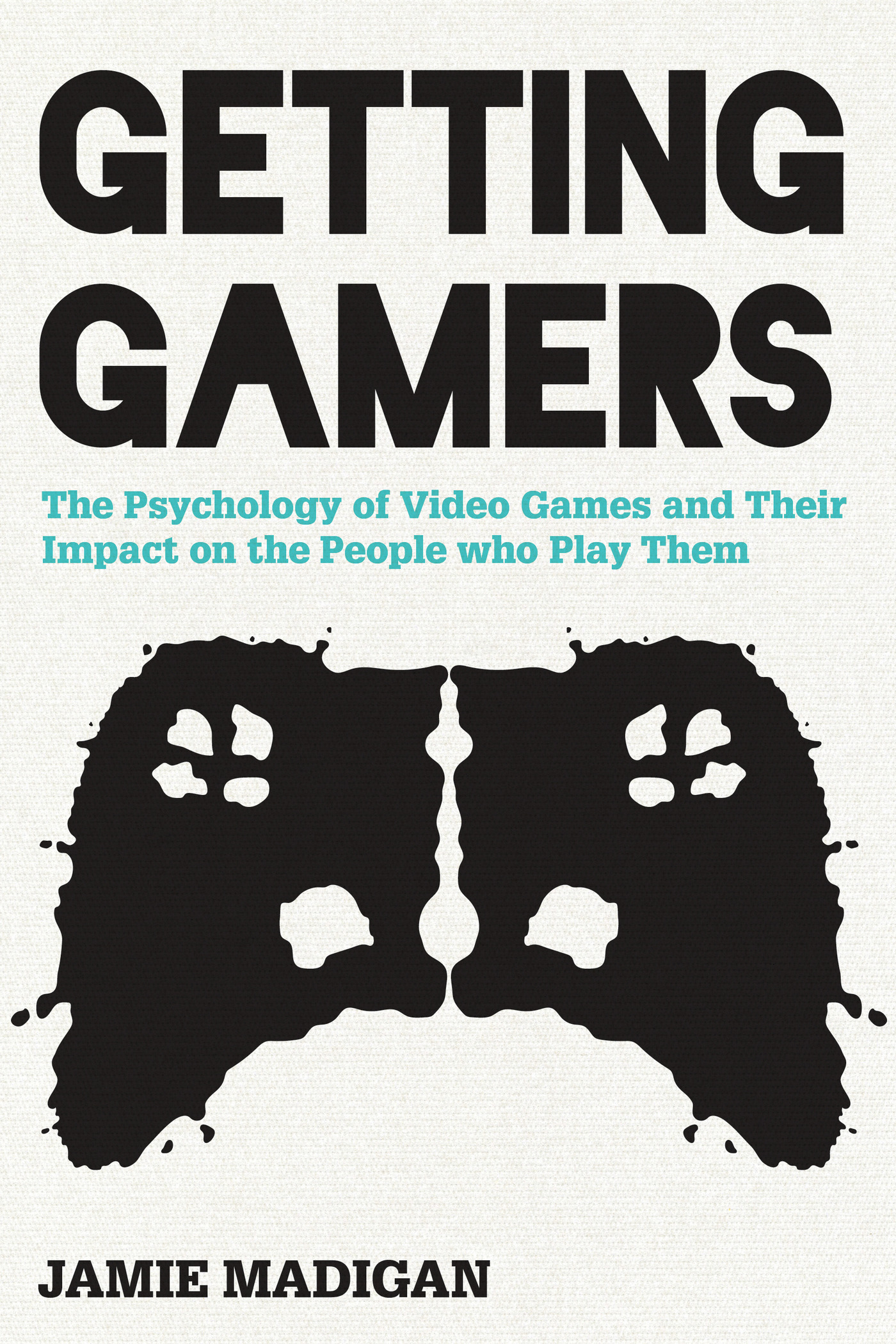Getting Gamers
Getting Gamers
The Psychology of Video Games and Their Impact on the People Who Play Them
Jamie Madigan
ROWMAN & LITTLEFIELD
Lanham Boulder New York London
Published by Rowman & Littlefield
A wholly owned subsidiary of The Rowman & Littlefield Publishing Group, Inc.
4501 Forbes Boulevard, Suite 200, Lanham, Maryland 20706
www.rowman.com
Unit A, Whitacre Mews, 26-34 Stannary Street, London SE11 4AB
Copyright 2016 by Harold James Madigan
All rights reserved. No part of this book may be reproduced in any form or by any electronic or mechanical means, including information storage and retrieval systems, without written permission from the publisher, except by a reviewer who may quote passages in a review.
British Library Cataloguing in Publication Information Available
Library of Congress Cataloging-in-Publication Data
Madigan, Jamie.
Getting gamers : the psychology of video games and their impact on the people who play them / Jamie Madigan.
pages cm
Includes bibliographical references and index.
ISBN 978-1-4422-3999-9 (cloth : alk. paper) -- ISBN 978-1-4422-4000-1 (electronic)
1. Video games--Psychological aspects. I. Title.
GV1469.34.P79M33 2015
794.8--dc23
2015014719
 TM The paper used in this publication meets the minimum requirements of American National Standard for Information Sciences Permanence of Paper for Printed Library Materials, ANSI/NISO Z39.48-1992.
TM The paper used in this publication meets the minimum requirements of American National Standard for Information Sciences Permanence of Paper for Printed Library Materials, ANSI/NISO Z39.48-1992.
Printed in the United States of America
For my GameSpy peeps. For showing me how to be
passionate about video games.
Acknowledgments
I am grateful for many people who encouraged and helped me while I worked on this book. Thanks to my wife, Geralyn, for cheering me on. Even though she doesnt completely understand my obsession with video games, she knows they are important to me. And to my daughters, Sammy and Mandy, for playing games with me and talking to me about them. Thanks to my agent, Courtney Miller-Callahan, and my editor, Suzanne Staszak-Silva, who both believed me when I was trying to convince everyone that this book was a good idea. A big thank-you also to people who took time to talk to me on the phone or via e-mail to help, including Jeffrey Lin, David McRaney, Andrew Przybylski, Scott Rigby, Nick Yee, Ron Faber, Dmitri Williams, Nir Eyal, Nicholas Davidson, Jeremy Blackburn, Morris Hollbrook, Robert Schindler, Nicholas Bowman, Mike Ambinder, Max Loh, Wai Yen Tang, Dave Mark, and Steve Gaynor. Thank you to Samantha Naumann for saving me a few trips to the library. And the biggest thank-you of all to everyone who visited www.psychologyofgames.com, especially those of you who wrote to me or introduced themselves at conferences. Ultimately, youre the ones who convinced me to write this book. Good job.
Introduction
The history of video games started in a small Norwegian village during the 1680s, when a precocious young fisherman named Billy SadPanda42 Jackson created Call of Duty 3 out of sticks and moxie. Strictly speaking, parts of that sentence are not true, but Im told that every book about video games has to have a section up front on the history of the medium. Something about how some inventive nerd at MIT made Spacewar! in 1962 and about how Pong was originally found only in bars. So I thought Id just get that out of the way as quickly as possible and with as little research as possible so that we could get to the good stuff that everybody cares about: the video games of today.
Theyre huge! Here, have some impressive numbers: a 2015 report by the Entertainment Software Association (ESA) shows that 51 percent of the households in the United States own at least one console dedicated to gaming (e.g., a Nintendo Wii U, a PlayStation, or an Xbox). Furthermore, the ESA reported that 155 million Americans play games regularly and that they spent $22.4 billion on their hobby. Those numbers are much higher when you consider other gaming devices, such as phones, tablets, and personal computers. The Google Play store and the Apple App store have more than 800,000 apps each, and Apple recently reported in a January 2015 press release that in 2014 customers spent more than $10 billion on downloads (many of them games) in their app store alone. We live in a world where a video game can make over $1 billion in less time than it takes most of us to get caught up on laundry.
Gaming is also becoming more social and more of a shared experience. More than 70,000 gamers traveled to Seattle to attend the 2013 Penny Arcade Expo (PAX), where they spent three straight days sharing their passion for games, seeing new titles, and listening to their idols talk about the process of making games. The event sold out within six hours, with tickets between $40 and $95, depending on how many days one wanted to attend. The coveted 4-day passes sold out in just 23 minutes. In reaction to its growing popularity, the PAX organizers have added expos of similar size in Boston, San Antonio, and even Sydney, Australia. They all still sell out in hours to people who will travel from all over the world to attend. Other consumer-oriented annual events like Blizzcon and Quakecon also draw in many tens of thousands of attendees each, and video games have a growing presence at even more massive events like San Diego Comic-Con and South by Southwest. These events can each have hundreds of thousands of attendees.
Even if you dont play the big console releases or drive to Seattle and sleep in your car for three days so you can attend an expo, games are still all around you. Smart phones, Facebook, and the Web are stuffed with video games of all different kinds. Phones and tablets are the fastest growing area for video games, according to some market analysts and every bored commuter in the last few years. That sounds ridiculous, but while King is leading the pack with its game, others arent far behind. Mobile and social games are stretching the definition of video game to fill in all the corners of popular culture.
What, for example, could be more traditional than the Boy Scouts of America and soft drinks? Along with merit badges for starting fires and finding their way out of the woods (which are now on fire), Boy Scouts can now earn a Game Design merit badge by scrutinizing four video games they have played and thinking about them critically in terms of their design and themes. They might do this while sipping on a specially packaged Spartan Fuel bottle of Mountain Dew featuring Master Chief, the hero from the Halo series of first-person shooter games. In 2013, the Smithsonian American Art Museum even started accessioning games like That Game Companys Flower into its permanent collection in order to better preserve the modern relics of art and culture. And, of course, I dont have to tell you how easy it is to find characters in television shows like Big Bang Theory that play games, or product placements like when Walt Jr. played the appropriately named Rage during an episode of Breaking Bad.
And to their credit, these television shows are more and more often showing gamers as they are in real life: normal. Its worth noting that I use the term gamer very generally throughout this book. Some people dont like the label, thinking that its too restrictive, too awkward, or invokes too many unpleasant stereotypes. I get all that, but lets be honest: Im not going to write people who play video games every time a pithier and equally descriptive single word will do. And just as the definition of video games is evolving, the idea of what qualifies as a gamer is also changing. For one, theyre not just for kids; many adults who grew up playing games with Mario, Link, or the
Next page
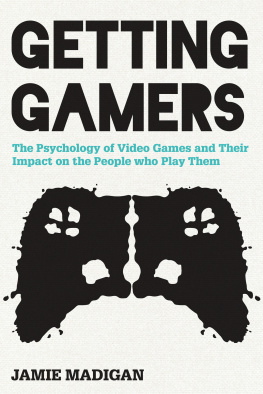


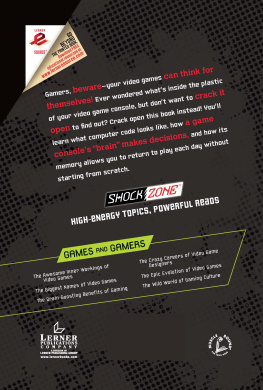
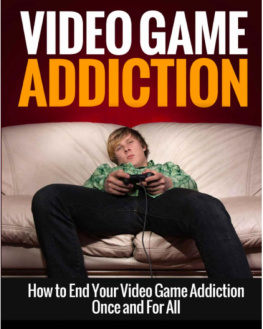
![Mark J. P. Wolf (editor) - Encyclopedia of Video Games: The Culture, Technology, and Art of Gaming [3 volumes]](/uploads/posts/book/279290/thumbs/mark-j-p-wolf-editor-encyclopedia-of-video.jpg)


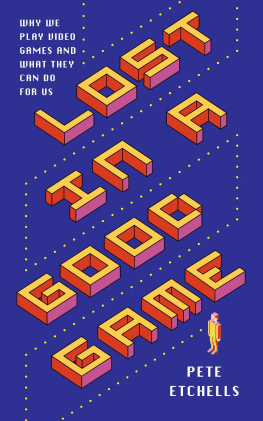

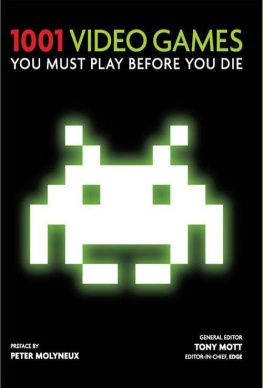
 TM The paper used in this publication meets the minimum requirements of American National Standard for Information Sciences Permanence of Paper for Printed Library Materials, ANSI/NISO Z39.48-1992.
TM The paper used in this publication meets the minimum requirements of American National Standard for Information Sciences Permanence of Paper for Printed Library Materials, ANSI/NISO Z39.48-1992.